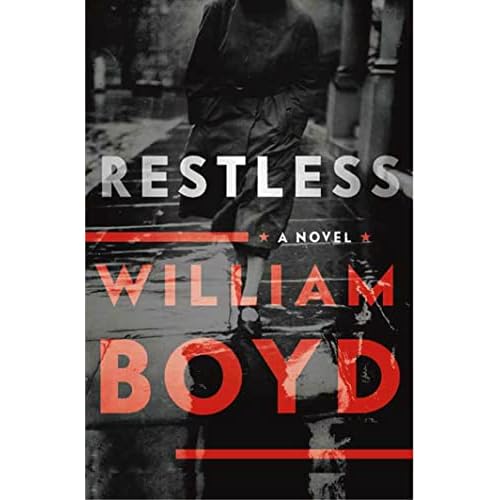I Spy, too
By coincidence, at least three books this year have fulfilled the Graham Greene-John le Carre aesthetic much more satisfyingly than either of the Robert Littell spy novels I recently read-- despite all the attention and reviewers' praise that Legends and The Company received when they first appeared. All three are more modest, more emotionally affecting, intriguing and, needless to say, more stylistically interesting than the rather programmatic Littells.
To begin with the one that's most like a genre spy novel: William Boyd's  Restless is a period piece concerning Britain's little-known undercover operations in the U.S. prior to Pearl Harbor -- these were sizable propaganda and disinformation efforts to persuade America to enter the war against the Nazis.
Restless is a period piece concerning Britain's little-known undercover operations in the U.S. prior to Pearl Harbor -- these were sizable propaganda and disinformation efforts to persuade America to enter the war against the Nazis.
Told in a two-track fashion, Restless alternates between the story of Ruth, an Oxford history grad making ends meet teaching English to immigrants in the late '70s, and her aged mother Sally, who starts acting strangely paranoid. Ruth eventually learns that much of her family life was a fake: Sally isn't even Sally. She was a World War II spy, a Russian emigre in France who was hired by the British secret service (she wanted to avenge her murdered brother) and who took on a British identity. Decades later, a badly compromised operation that Sally undertook in America seems to be catching up with her: She thinks the traitor she discovered back then has finally tracked her down.
Restless is highly entertaining in that somber but suspenseful manner the British do well. The setting moves from France to England to New York to New Mexico and there are a number of sub-plot complications -- Ruth has visitors staying with her from Germany, one of whom may be smuggling drugs or may be a distant member of the Baader-Meinhof gang -- but the novel feels small and tightly-focused like a family drama. It's really about only three people: Ruth, Sally and Romer, the man who brought Sally into the wartime undercover trade.
In an earlier posting -- I Spy -- I argued that the best espionage novels generally relate some variant of three different stories, the story of betrayal, brutalization or sacrifice. Many also depict what I'd call the persistence of history. Some personal, political or professional event in the past cannot be escaped. In many cases, this simply means that the Cold War's demands are inexorable and ruthless or the longstanding clash between nations still chews up individuals, despite their best intentions.
But obviously, history's continued grip on the present is often a matter of old secrets or unfolding conspiracies. The chickens coming home to roost, as it were. It's hardly an accident that the master ironists of the so-called "paranoid" school -- Thomas Pynchon, Don DeLillo -- often use the equipment of noir-ish espionage thrillers: codes, secret agencies, government murder plots, terrorists, double agents and the like, just as Vladimir Nabokov repeatedly used the elements of the murder mystery in novel after novel. Consider Gravity's Rainbow, The Crying of Lot 49 or Running Dog and Libra. In fact, in Underworld, DeLillo calls all this "dietrologia," the "science of dark forces," the science of what lies behind events. It's an apt 'term of art' for the spy novel.
Obviously, Restless is an affecting demonstration of this, with its intertwining of past and (roughly) present. So, too, in a very different (but still disturbing) fashion is Forgetfulness by Ward Just-- up next.
Categories:
Blogroll
Critical Mass (National Book Critics Circle blog)
Acephalous
Again With the Comics
Bookbitch
Bookdwarf
Bookforum
BookFox
Booklust
Bookninja
Books, Inq.
Bookslut
Booktrade
Book World
Brit Lit Blogs
Buzz, Balls & Hype
Conversational Reading
Critical Compendium
Crooked Timber
The Elegant Variation
Flyover
GalleyCat
Grumpy Old Bookman
Hermenautic Circle
The High Hat
Intellectual Affairs
Jon Swift
Laila Lalami
Lenin's Tomb
Light Reading
The Litblog Co-op
The Literary Saloon
LitMinds
MetaxuCafe
The Millions
Old Hag
The Phil Nugent Experience
Pinakothek
Powell's
Publishing Insider
The Quarterly Conversation
Quick Study (Scott McLemee)
Reading
Experience
Sentences
The Valve
Thrillers:
Confessions of an Idiosyncratic Mind
Crime Fiction Dossier
Detectives Beyond Borders
Mystery Ink
The Rap Sheet
Print Media:
Boston Globe Books
Chicago Tribune Books
The Chronicle Review
The Dallas Morning News
The Literary Review/UK
London Review of Books
Times Literary Supplement
San Francisco Chronicle Books
Voice Literary Supplement
Washington Post Book World

3 Comments